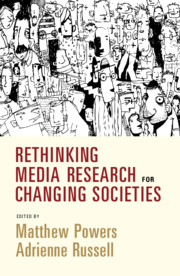Book contents
- Rethinking Media Research for Changing Societies
- Communication, Society and Politics
- Rethinking Media Research for Changing Societies
- Copyright page
- Contents
- Figure
- Contributors
- Acknowledgments
- 1 Introduction
- Part I Living in a Datafied World
- Part II Journalism in Times of Change
- Part III Media and Problems of Inclusion
- Part IV Engagement with and through Media
- Part V The Role of Scholars
- 12 What Is Communication Research For? Wrestling with the Relevance of What We Do
- 13 Communication as Translation
- 14 What Are We Fighting For? Academia or the Humility of Knowledge
- Epilogue
- Other Books in the Series (continued from page ii)
- References
Epilogue
What Media for What Public Life?
from Part V - The Role of Scholars
Published online by Cambridge University Press: 18 September 2020
- Rethinking Media Research for Changing Societies
- Communication, Society and Politics
- Rethinking Media Research for Changing Societies
- Copyright page
- Contents
- Figure
- Contributors
- Acknowledgments
- 1 Introduction
- Part I Living in a Datafied World
- Part II Journalism in Times of Change
- Part III Media and Problems of Inclusion
- Part IV Engagement with and through Media
- Part V The Role of Scholars
- 12 What Is Communication Research For? Wrestling with the Relevance of What We Do
- 13 Communication as Translation
- 14 What Are We Fighting For? Academia or the Humility of Knowledge
- Epilogue
- Other Books in the Series (continued from page ii)
- References
Summary
This chapter reviews the core issues raised in the book, and suggests points for further research. Silvio Waisbord discusses how media scholarship might best engage publics and how it might best intervene in shaping media and public life. Given the scope and scale of current change in the communication landscape, Waisbord calls on media scholars to revisit the analytical scaffolding and normative arguments that form the basis of the field. He calls on scholars to acknowledge and work to better understand the reality of fragmented media ecologies, heterogeneous forms of public engagement, and fractured public knowledge.
- Type
- Chapter
- Information
- Rethinking Media Research for Changing Societies , pp. 205 - 218Publisher: Cambridge University PressPrint publication year: 2020



